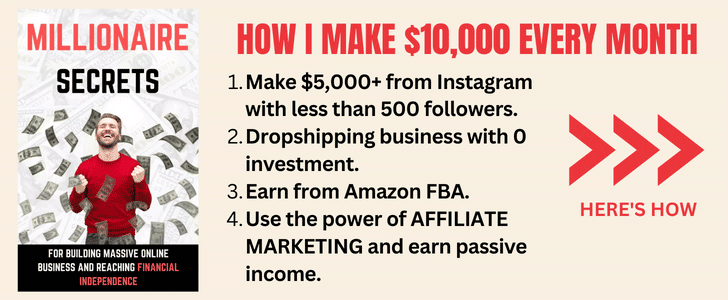When running any business, you may be expected to conduct thorough research and plan meticulously, but it's equally important to trust your gut instincts. Your instincts are shaped by your past experiences, subconscious observations, and innate feelings.
They often know what’s best for you, even when your logical mind is unsure. It's your internal GPS. Your gut feelings often guide your decisions, and you can build a successful online business that aligns with your values. Agree?

Quick Decision-Making
The online world moves at a breakneck speed. Opportunities and challenges arise unexpectedly, and you often have to make decisions on the spot. Overthinking can lead to paralysis by analysis, whereas trusting your gut can lead to quicker, more confident decisions.
For example, in affiliate marketing, there are endless options for products or services to promote. Your gut feeling can help you quickly identify which options align with your brand and will be appreciated by your followers.
You might come across a product that logically seems profitable, but your gut may signal that it doesn't align with your values or the needs of your followers. Trusting this instinct can save you from promoting a product that could potentially harm your reputation or disappoint your followers.
Did You Know? [Business Decision Statistics - 1]
- Intuition in Leadership: Approximately 45% of corporate executives rely heavily on intuition when making big decisions.
- Gut vs. Data: Around 62% of business executives often rely more on gut feelings than purely on data analysis.
- Success Rates: Studies suggest that decisions made with gut feelings have about a 60% success rate.
- Quick Decisions: About 40% of managers make important decisions within one to five minutes.
- Experience Factor: Experienced entrepreneurs are 68% more likely to use gut instincts than first-timers.
Challenges!
No matter how well-prepared you are, challenges will arise. Your gut instincts can provide insights into innovative solutions that may not be immediately obvious to your logical mind.
Challenges are inevitable whether it's dealing with declining engagement rates or changes in the affiliate program terms. Your gut feelings can guide you in navigating these challenges.
For instance, if you notice a decline in engagement and your gut feeling suggests that it's due to a change in your content style, trust that instinct. It may prompt you to revert to your original style or try a new approach that resonates better with your followers.
Building Strong Alliances
Your gut can help you sense the intentions of clients, partners, and competitors. It can guide you towards forming mutually beneficial relationships and steer you away from potentially harmful ones.
Building strong relationships with your followers and affiliate partners is crucial for long-term success. Your gut feelings can help you sense the intentions of potential affiliate partners.
For example, if you're considering a partnership with a company, but something feels off during your interactions, that's your gut signaling caution. It may be wiser to decline the offer rather than entering into a partnership that could be problematic later on.
Inspiring Innovation

To stand out in the crowded online marketplace, you need to think creatively. Your gut instincts can help spark innovative ideas that differentiate your business from competitors.
Innovation is crucial to stay ahead of competitors. Your gut instincts can inspire creative ideas for content, promotions, or new ways to engage your followers.
For example, if you have a gut feeling that a particular type of content, such as video tutorials or interactive quizzes, will resonate with your followers, trust that instinct. It may lead to a novel approach that sets you apart from competitors and adds value to your followers.
Did You Know? [Business Decision Statistics - 2]
- Start-up Decisions: Nearly 80% of successful start-up owners credit gut feelings in crucial early decisions.
- Confidence in Intuition: About 75% of senior executives interviewed believe in trusting their gut in decision-making.
- Gender Differences: Women are 10% more likely than men to consider their intuition in business contexts.
- Cultural Variations: Asian business leaders are 20% more likely to trust intuition compared to Western counterparts.
- Strategic Decisions: In strategic decision-making, 90% of executives use both analysis and intuition.
Boosting Self-Confidence
Trusting your gut reinforces self-belief, empowering you to tackle challenges head-on and seize opportunities with confidence.
Trusting your gut boosts your self-confidence, empowering you to face challenges and seize opportunities in affiliate marketing.
For instance, if you have a gut feeling that investing in a specific course or attending a networking event will benefit your business, trust that instinct. Even if it's outside your comfort zone, taking action based on your gut feelings reinforces your self-belief and can lead to personal and professional growth.
How Gut Feelings Work:
Our intuition is a spontaneous response that our body and mind produce based on past experiences, subconscious observations, and innate instincts. It often manifests as physical sensations, such as butterflies in the stomach, or a sense of certainty or doubt about a situation.
While our logical mind analyzes situations based on available data, our intuition provides insights based on subconscious patterns and instincts. Both are essential for making well-rounded decisions, but in situations where complete information is not available, or quick decisions are required, trusting your gut can be incredibly valuable.
In the context of affiliate marketing, your gut feelings can guide you in various ways:
Did You Know? [Business Decision Statistics - 3]
- High-Risk Decisions: In high-stakes scenarios, reliance on gut feeling increases to about 70%.
- Innovation and Gut Feeling: Around 85% of business leaders believe intuition can drive new ideas and innovation.
- Hiring Decisions: 65% of HR professionals have sometimes relied on their gut for recruitment decisions.
- Gut Instinct Training: 55% of companies offer no training on developing intuition for decision-making.
- Misjudging by Gut: About 30% of gut decisions in business result in suboptimal outcomes.
Choosing Your Business Model and Niche
- What: You may already know your business model but your niche is the area of expertise or interest you’ll focus on. It’s essential to choose a niche that is not only profitable but also aligns with your passions and interests.
- How: Trust your instincts to guide you towards a niche that excites you and feels right. For example, if you have a passion for fitness and a gut feeling that creating an online fitness program is the right path for you, trust that instinct.
Creating Good Content
- What: Creating good content is the absolute basic for attracting and engaging your target market. Good as in your own - if your intuition says it's valuable, it's valuable for someone else.
- How: Trust your instincts to guide you on the type of content that will resonate with your target market. For instance, if you have a gut feeling that your audience will appreciate video tutorials over written guides, trust that instinct and create video content.
Find Fairly-Priced Products
- What: Find products that you think are fairly priced. It should reflect the value you provide and be affordable for your target market.
- How: Trust your instincts to guide you towards a price that feels fair and reflects the value you provide. For example, if someone's selling an online course for $1,000 but your gut feeling tells you that it's overpriced from the way the seller talks, trust that instinct.
Marketing Your Business
- What: Marketing is essential for attracting customers to your online business.
- How: Trust your instincts to guide you towards the marketing strategies that align with your business values and goals. For instance, if you have a gut feeling that social media advertising will be more beneficial for your business than search engine advertising, trust that instinct.
Building Relationships
- What: Building strong relationships with your customers and partners is crucial for long-term success.
- How: Trust your instincts to guide you towards the right people and opportunities. For example, if you have a gut feeling that collaborating with a particular influencer will benefit your business, trust that instinct.
Scaling Your Business
- What: Scaling your business involves growing it in a sustainable manner.
- How: Trust your instincts to guide you towards the right opportunities for growth. For instance, if you have a gut feeling that it’s the right time to hire additional staff or invest in new technology, trust that instinct.

How to Tune into Your Instincts
Sharpening your instincts is essential for making better decisions, fostering creativity, and enhancing self-confidence. Here are some practical ways to hone your instincts:
#1 Practice Mindfulness
- What: Mindfulness involves staying present and fully engaging in the present moment. It helps you become more aware of your thoughts, feelings, and physical sensations, which are all components of your instincts.
- How: Start by setting aside a few minutes each day for mindfulness exercises, such as meditation or deep breathing. Focus on your breath, and when your mind wanders, gently bring it back to your breath. Pay attention to how your body feels and the thoughts that cross your mind.
- How Often: Daily.
- How Long: Start with 5-10 minutes each day and gradually increase the time as you feel comfortable.
Did You Know? [Business Decision Statistics - 4]
- Speed of Decision-Making: Intuition-based decisions are typically made 10 times faster than analytical ones.
- Market Predictions: Around 70% of stock traders use gut feelings in part to predict market trends.
- Intuition vs. Analysis Conflict: In 50% of cases, business intuition conflicts with analytical findings.
- Failure and Gut Instincts: Failed entrepreneurs are 15% more likely to disregard their gut in subsequent ventures.
- Importance in Startups: 90% of startup leaders view intuition as a critical component of decision-making.
#2 Listen to Your Body
- What: Your body often gives you signals about your feelings. For example, a knot in your stomach may indicate stress or anxiety, while a feeling of lightness may indicate happiness or excitement.
- How: Pay attention to how your body reacts in different situations. Note any physical sensations you experience, whether it's tension in your shoulders or a fluttering in your stomach.
- How Often: Continuously throughout the day.
- How Long: It only takes a moment to tune into your body.

#3 Reflect on Your Experiences
- What: Reflecting on your past experiences and the gut feelings you had at the time can help reinforce your trust in your instincts.
- How: Set aside time each week to reflect on your experiences. Consider situations where your instincts were spot on, as well as times when you didn’t listen to your gut and wished you had.
- How Often: Weekly.
- How Long: 15-30 minutes.
#4 Act on Your Instincts
- What: The more you act on your instincts, the more you reinforce your trust in them.
- How: When you have a gut feeling about something, act on it. It could be as simple as calling a friend you’ve been thinking about or taking a new route to work because it feels right.
- How Often: As often as you have a gut feeling.
- How Long: Varies depending on the situation.
#5 Limit Information Overload
- What: In today’s digital age, we are bombarded with information. This overload can drown out your instincts.
- How: Limit your exposure to unnecessary information. Be selective about the news you consume, and take breaks from social media and other digital distractions.
- How Often: Daily.
- How Long: Varies depending on your lifestyle.
#6 Practice Decision-Making
- What: The more decisions you make, the more you exercise your decision-making muscle, including your instincts.
- How: Practice making decisions without overthinking. Start with small decisions, like what to eat for lunch, and work your way up to bigger ones.
- How Often: Daily.
- How Long: Varies depending on the decision.
I must add that it's okay to take it one step at a time. Just remember to strike a balance between your intutition and using logical reasoning. You know that both are essential for making well-rounded decisions.
Trust Your Intuitions Examples

Example 1:
You have a strong gut feeling about a new product idea that doesn’t exist in the market yet. The logical analysis shows demand for similar products, but there’s no data to support your exact idea because it’s new. Trust your gut and create a minimum viable product (MVP) to test the market.
Example 2:
You’re choosing between two marketing strategies. One is proven and widely used in your industry. The other is unconventional but feels right to you. Try allocating resources to both strategies and see which one performs better.
Example 3:
You come across a potential partnership that looks great on paper, but something feels off. Instead of ignoring your feelings, dig deeper. Are there any red flags you missed? Are there past experiences or learnings that are causing you to feel this way?
Example 4:
You’re creating content for your online business, and you have a gut feeling that a particular topic, though not very popular, will resonate deeply with your target customers. Instead of dismissing this idea because it’s not ‘trending’, trust your intuition and create content around that topic. It might just be the unique angle that sets you apart from competitors.
Example 5:
You’re about to choose a supplier for your products. One supplier offers a lower price, but you have a nagging feeling that the quality will not be up to par. Another supplier has a slightly higher price, but you feel more comfortable with their communication and reputation. Trusting your gut might mean choosing the second supplier, even if it’s more expensive.
Example 6:
You’ve been running ads on various social media platforms. The general advice and data suggest that one platform is the best for your industry. However, you notice that another platform, though less popular, is bringing in more engaged customers. Trusting your intuition might mean reallocating more of your ad budget to the less popular platform.
Example 7:
You receive an offer for a collaboration or joint venture that seems great on the surface, and everyone is advising you to go for it. However, something doesn’t feel right about it. Trusting your intuition might mean turning down the offer and waiting for a better fit.
Example 8:
You have been working tirelessly on a product, and you feel it’s ready for launch. However, as the launch date approaches, you have a strong gut feeling that there’s an important aspect you have overlooked. Instead of dismissing this as pre-launch jitters, take the time to review everything one more time. You might find a crucial detail that was missed.
Your intuition is a muscle that gets stronger with use. The more you practice listening to it and making decisions based on it, the more confident and successful you will become in your online business journey.



